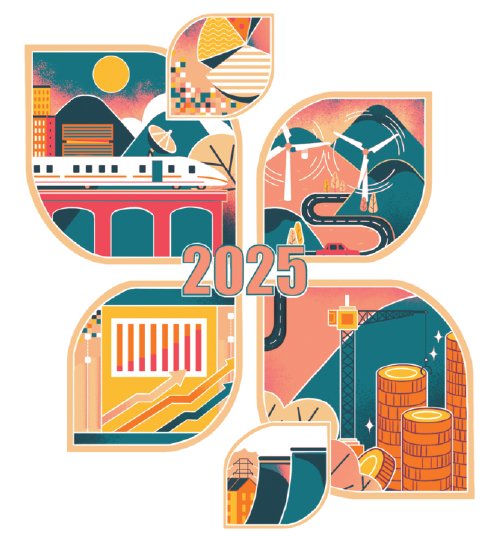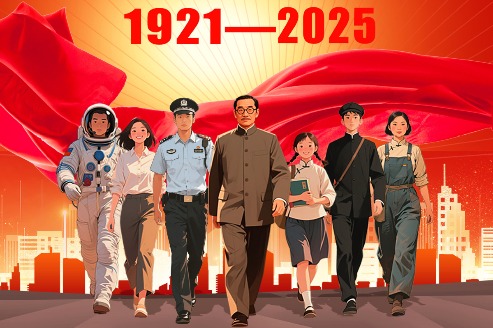Composure vital for China amid global uncertainty in 2025


SHI YU/CHINA DAILY
Editor's Note: How will the world outlook evolve in 2025? How will Sino-US relations develop after Donald Trump begins his second term? Gao Fei, vice-president of China Foreign Affairs University, shares his views with China Daily's Liu Jianna for Dialogue with Thinkers, China Daily's heavyweight high-end interview program. Below is an excerpt from the interview.
Q: The world has witnessed the Russia-Ukraine conflict since 2022, and the Israel-Palestine conflict since 2023, and in 2024 there was a sudden political upheaval in Syria. How do you view the evolution of the international situation?
A: The global order to some extent, is in disorder, which has led to the intensification of many existing conflicts around the world, as well as the emergence of new ones. The Russia-Ukraine conflict, when traced back, can be seen as a continuation of regional shocks following the collapse of the Soviet Union. Similarly, the Israel-Palestine conflict has persisted since World War II, continuing to pose a significant grave challenge to stability in the Middle East.
In 2024, the international political and security landscape was marked by turmoil and change. More than 4 billion people voted governments in or out of power in over 70 countries and regions, including in Iran — where an election was necessitated because of the unexpected death of president Ebrahim Raisi in a plane crash — and the US. While some elections threw up "surprises", the US presidential election resulted in a "Trump 2.0 shockwave".
Donald Trump's victory in the presidential election has made the US' role in the Russia-Ukraine conflict, which was in its third year in 2024, uncertain, while the European Union is struggling to deal with the emerging situation. And while both Russia and Ukraine have shown signs of fatigue, Ukraine took the fight to Russia's Kursk region.
As for the Israel-Palestine conflict, it too raged on, spreading across the Middle East with Yemen's Houthi forces imposing a blockade on the Red Sea, Israel and Iran exchanging attacks, and Hezbollah escalating its conflict with Israel. Israel's brutal assault on the Palestinian people in Gaza prompted the International Criminal Court to issue arrest warrants for Israeli leaders — as well as Hamas commanders for the Oct 7 attack.
Global power relations continued to evolve with a "new Cold War" looming, as the US pursues a dual containment strategy against China and Russia, and the EU remains indecisive due to a lack of clear strategic direction. Overall, there has been no winners. Peace and cooperation remain elusive.
The global economy remained disappointing in 2024, especially because the post-pandemic economic recovery did not happen as expected, with geopolitical tensions accelerating the reshaping of global supply chains. While Sino-US trade continued to grow amid fluctuations, China maintained its position as the world's leading goods trading country for the seventh consecutive year.
Despite this, the global economy remained stuck in stagnation, facing weak growth and high inflation, with no signs of a breakthrough from the technological and industrial revolutions. This prompted countries to intensify their risk management measures, which has led to "over-securitization", which has impacted normal economic exchanges globally.
Since the lack of development posed the greatest risk, global economic cooperation is the only way countries can overcome the crisis.
The coexistence of competition and cooperation continued to impact global governance, while globalization and the new technological revolution deepened the interdependence of countries. However, the benefits were uneven, exacerbating wealth inequality and the digital divide, particularly across different countries, social classes and generations. This in turn gave rise to the rampancy of populism, and made political polarization more pronounced especially in the US and Europe.
Q: In a world marked by constant turbulence and evolving conflicts, how should China navigate its path in 2025 to secure its future and contribute to global stability?
A: In spite of the Global South's call for stronger governance cooperation, protectionism and unilateralism continued to rise in some countries. As such, the world order in 2025 is expected to remain in a state of disarray, giving rise to new challenges.
Regional hotspots such as the Russia-Ukraine conflict and the Israel-Palestine conflict are unlikely to see a swift resolution, while economic stagnation and intensifying competition over limited resources and markets will exacerbate global turmoil.
The advancement of technology has added another layer of complexity to the international situation. Therefore, 2025 is likely to witness sustained global tensions, underscoring the need for countries to focus on internal resilience amid external challenges.
With the world entering a new era of upheaval and change, China actively played the role of a responsible major country, safeguarding its sovereignty, security and development interests while promoting global peace and development. China worked to create a favorable external environment for its own growth and global benefits and projected a distinctive national image on the world stage.
Despite the upheaval in international relations, China is experiencing one of the most favorable periods of development in its modern history. As a stabilizing force in the world, China's growing strength enables it to fight against global disorder effectively. However, it is crucial for China to focus on its domestic objectives while navigating external complexities.
China's role has evolved through experiences, pushing it to the forefront of global leadership. But stepping into the spotlight requires more than just being on stage; it must learn to engage with the audience. This shift in China's diplomatic role is essential to its continued growth.
Unlike the United States, which emphasizes strategic competition with China, China remains steadfast in its commitment to peaceful development and win-win cooperation. China's goal is not to vie with the US for global hegemony but to engage constructively with the world and win the trust and support of the global community. This transformative approach underscores a vision of leadership rooted in mutual respect and shared prosperity, rather than dominance.
Ultimately, China's development involves taking on greater responsibility in global governance. It is not just about leadership but about showing the commitment and wisdom needed to guide the world through uncertainties. This is a pivotal moment for China's diplomacy, as it assumes a central role in shaping a peaceful and stable world order.
For instance, the South China Sea disputes transcend territorial contention among the countries involved. They also raise questions about the improvement of international legal frameworks. Although historical territorial disputes cannot be ignored, building mutual trust and fostering cooperation among nations could transform the region into a collaborative area. This approach reflects a broader necessity to find constructive solutions to the world's conflicts amid a shifting world order.
Q: What are the key aspects of international relations in 2025?
A: The relations among major countries are obviously of great significance. The international order, equivalent to the framework of the system, is defined by the relations between major countries. Whether these major countries can cooperate, and whether they can lead smaller countries to find cooperation paths in certain areas and solve some existing problems, is of paramount importance.
Recently, US President-elect Donald Trump mentioned that if China and the US work together, they can solve many of the world's problems. For two large countries like China and the US, whose GDP exceeds 40 percent of the world's total, cooperation in various fields could help avoid sliding into a new Cold War. If the two countries can truly contribute to better global governance and shoulder their responsibilities, many global problems can be resolved.
Indeed, as the world's two largest economies, China and the US have a combined GDP that accounts for more than 40 percent of the global total. Genuine cooperation between the two countries could improve global governance and help solve many problems. But to avoid a Cold War-like confrontation, the US has to respect China's core interests, particularly the Taiwan question.
For China, Taiwan question remains a core interest that cannot be compromised. For decades, it has been the linchpin of China-US relations. Any US attempt to use the Taiwan question as leverage that risks crossing China's red line and could irreparably damage bilateral ties. Strategic competition between the two countries is unlikely to diminish, as evidenced by the US' formal designation of China as a strategic competitor in its 2017 and 2022 national security strategies.
Nevertheless, economic globalization creates mutual dependencies that could either serve as a basis for collaboration or a tool causing mutual harm, depending on the level of trust between the two countries.
The US' containment strategy has underscored the importance of technological self-reliance for China. All countries, especially major countries, need to have a strong foundation in innovation and a mechanism to promote high-level international cooperation. By maintaining strong ties with the rest of the world, China ensures that any US decoupling attempt has broader repercussions for the US.
China's commitment to opening-up and collaboration allows for low-cost innovation and shared prosperity. In this context, fostering global exchanges in science and technology is essential. By focusing on its strategic confidence, China can drive innovation and development while retaining the initiative in China-US relations.
Q: Will the Global South, such as the expanding BRICS, challenge the US' role in world order?
A: I think the real issue is not about the Global South, or BRICS economies trying to de-dollarize, but about how the dollar regains its credibility. How can the dollar prove its reliability? This is a question the US needs to answer. If the US can do this, we would welcome the dollar as part of a stable international system. The real problem now is the US dollar, and whether the US is willing to play a constructive role in global development and uphold global peace and development.
The rise of the Global South reflects the shared aspirations of developing nations to prioritize growth despite geopolitical tensions, and make development as their primary national strategy. The BRICS nations, encompassing diverse strengths such as resource abundance (Russia and Brazil) and industrial capabilities (China), exemplify this collective drive.
BRICS cooperation offers a pathway toward a more equitable international system. By leveraging their collective resources, population and industry capacity, these countries can address systemic inequalities and promote shared prosperity. For instance, the concerns about de-dollarization are less about BRICS actively undermining the dollar and more about whether the US can maintain trust in its currency by engaging in constructive global interaction.
China frequently faces criticism from Western countries, which often misrepresent its actions and intentions. They have scrutinized China-proposed development programs such as the Belt and Road Initiative despite such programs improving global connectivity. Similarly, the West has criticized China for its leadership in renewable energy, accusing it of having overcapacity, despite its contributions to green development.
Such challenges highlight the need for resilience and clarity in China's approach to international relations. Staying focused on long-term goals, responding to criticism with facts, and continuously refining its strategies will enable China to project a positive and credible global image. By fostering mutual benefit and adhering to principles of fairness and innovation, China can establish itself as a widely respected country and continue to be a stabilizing force in the evolving world order.
The views don't necessarily reflect those of China Daily.
If you have a specific expertise, or would like to share your thought about our stories, then send us your writings at opinion@chinadaily.com.cn, and comment@chinadaily.com.cn.

































